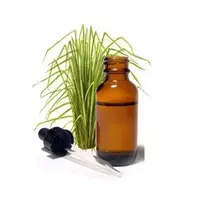Vetiver oil

The vetiver plant, which, in fact, is a very tall dense grass with a height of often about two meters, is considered a native of India, although today it is widely cultivated in the Caribbean. Interestingly, the vetiver is related to lemograss (lemon grass), citronella, as well as some other herbs with a rich aroma.
As is known, the vetiver is not suitable for culinary purposes, but the special substance obtained on the basis of this plant is very highly appreciated in the food industry. Vetiver essential oil is widely used in India - some types of syrups, alcoholic beverages, as well as ice cream are made from it.
Vetiver oil is extracted by distillation from the roots of the plant, or rather from their thinnest outer skin, and this process is actually quite long and time-consuming. As a result, the characteristic property of the vetiver oil is its very strong "lower tone, " which determines the use of this concentrate for aromatizing a variety of products.
Thick, dense and heavy, vetiver oil is distinguished by a dark brown color. The following components are distinguished in its composition: vetiveron, vetivin, vetiverol and cadinene. It is due to the content of these substances that the essential oil of vetiver is characterized by its unique thin, deep, slightly smoky smell, which slightly resembles the aroma of myrrh and patchouli. True, in dissolved form, vetiver oil has a more pronounced lemon tint.
The benefits of vetiver oil are as valuable as the scent of this natural concentrated product itself. For example, in modern perfumes, it often acts as a basic note in perfumes, and is also used as a fixer in expensive cosmetics.
In addition, one cannot but say about the immunostimulatory property of vetiver oil, due to which it helps to strengthen a person's ability to withstand stresses and produce protective forces against many diseases. Vetiver oil has the property of improving local circulation, thanks to which some doctors recommend its use for muscle pain, as well as for complex therapy of arthritis and rheumatism.
Natural vetiver oil is quite expensive, but it is characterized by a wide range of positive effects on the human body. This is due to the regulatory, rejuvenating, antiseptic, cleansing, angiotonic, laxative, diuretic, analgesic, sweating properties of vetiver oil. It is rightfully considered one of the most effective natural remedies for hoarseness, laryngitis, inflammation of the vocal cords, cough, tracheitis and bronchitis.
899 kCal vetiver oil
Energy value of vetiver oil (Ratio of proteins, fats, carbohydrates - ju):
Proteins: 0 g (~ 0 kCal)
Fats: 99.9 g (~ 899 kCal)
Carbohydrates: 0 g (~ 0 kCal)
Energy ratio (b | y): 0% | 100% | 0%
 Español
Español Français
Français Português
Português Русский
Русский 简体中文
简体中文 繁體中文
繁體中文 日本語
日本語 한국어
한국어 العربية
العربية Türkçe
Türkçe Қазақ
Қазақ Deutsch
Deutsch Italiano
Italiano Українська
Українська
